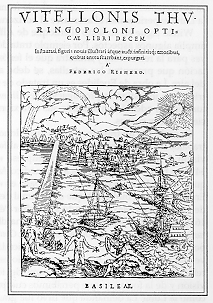
Vitello
Vitello (Polish: Witelon; German: Witelo; c. 1230 – 1280/1314) was a Polish friar, theologian, natural philosopher and an important figure in the history of philosophy in Poland.
For other uses, see Vitello (disambiguation).Name[edit]
Vitello's name varies with some sources. In earlier publications he was quoted as Erazmus Ciolek Witelo, Erazm Ciołek, Vitellio and Vitulon. Today, he is usually referred to by his Latin name Vitello Thuringopolonis, often shortened to Vitello.
Life[edit]
Vitello's exact birth-name and birthplace are uncertain. He was most likely born around 1230 in Silesia, in the vicinity of Legnica.[1] His mother came from a Polish knightly house, while his father was a German settler from Thuringia. He called himself, in Latin, "Thuringorum et Polonorum filius" — "a son of Thuringians and Poles." He studied at Padua University about 1260, then went on to Viterbo. He became friends with William of Moerbeke, the translator of Aristotle from Greek language into Latin. Vitello's major surviving work on optics, Perspectiva, completed in about 1270–78,[2] was dedicated to William. In 1284 he described the reflection and refraction of light.[3]
Other works[edit]
In Perspectiva, Vitello refers to other works that he had written. Most of these do not survive, but De natura daemonum and De primaria causa paenitentiae have been recovered.
Legacy[edit]
The lunar crater Vitello is named after him.
Vitello and his thoughts
Studies